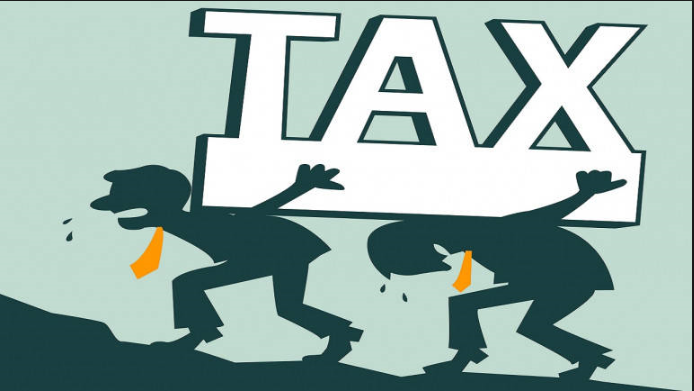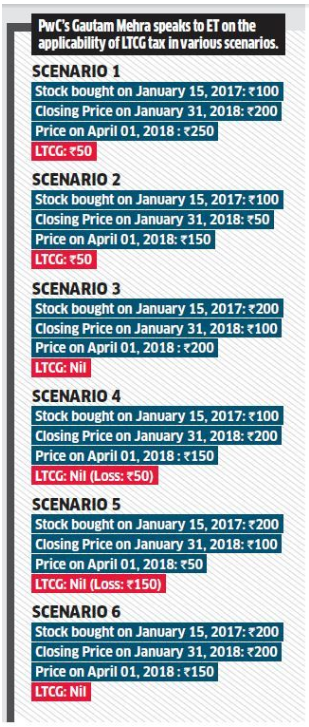
In Budget 2018, Finance Minister Arun Jaitley has re-introduced the Long Term Capital Gains (LTCG) tax on Stocks / Shares.
What has changed?
Since 2001-2005, LTCG was exempt from tax. If the investor is selling stick after 1 year (long term) , then no tax is payable on the profits made from such investment .
But now, the LTCG tax on shares has been re-introduced – Investors will have to pay 10% tax on profit exceeding Rs 1 lakh made from the sale of shares or equity mutual fund schemes held for over one year.
This is applicable for shares as well as equity mutual fund scheme as well.
For dividend mutual funds – Budget has also proposed 10% dividend distribution tax on dividend declared under Equity Schemes. Currently, DDT is not applicable for equity-oriented mutual funds it schemes that invests at least 65 % of its assets in equities. Mutual funds already pay DDT of 28.84 % on dividends declared under debt schemes
Applicable from
Since it is a Direct Tax proposal, it will be applicable for the Assessment Year FY19-20 (Financial Year FY18-19). In other words, the LTCG over Rs. 1 lakh made for the year FY18-19 will be liable to tax at 10%.
Currently it seems that the any LTCG will not be applicable for AY 18-19 (FY 2017-2018). However, we need to wait for more clarification or expert opinion on this. It appears that any sale upto 31-Mar-2018, no tax is payable on LTCG.
What is the relevance of the cut-off date of January 31, 2018?
Finance Minister has proposed grandfathering of LTCG up to January 31, 2018. Any incremental LTCG after that will be counted as LTCG for the new tax. See the example below:
Any sale made after April 1, 2018 will be liable to the new LTCG tax. One needs to segregate this LTCG into two parts:
- Part 1: LTCG made up to January 31, 2018. This will be highest price of the stock on January 31, 2018 minus the cost of acquiring stock; – this will be exempt from LTCG Tax.
- Part 2: LTCG made after January 31, 2018. This will be sale price minus highest price of the stock on January 31, 2018. – this will be assessed as LTCG (or capital loss) for tax, which will be computed at the rate of 10% (+ cess of 3%) only if exceeds Rs. 1 Lakh
Should I sell my shares?
It will not make any difference because of the “grandfathering clause” related to gains made upto 31-Jan-2018. Any “notional” LTCG gains made upto 31st Jan 2018 is not included in the LTCG Income. For e.g.

| 01-Jan-17 | Shares bought | Rs 1000 | Rs 1000 |
| 31-Jan-17 | Market Price | Rs 1500 | Rs 1500 |
| 01-Apr-18 | Market Price | Rs 2000 | Rs 1000 |
| LTCG | Exempt | Rs 1500 – Rs 1000 | Rs 1500 – Rs 1000 |
| LTCG / Loss | Taxable | Rs 2000 – Rs 1500 | Rs 1000 – Rs 1000 |
So it does not make sense to sell the shares only because of this LTCG news as it will not make any difference purely from tax perspective – whether you hold it or sell it.
If an investor sells stock or equity mutual fund held for over a year after April 1, LTCG tax will be calculated on the basis of the acquisition price or closing price on January 31, whichever is higher
Does this make Equity funds / Shares Unattractive?
Equity has given superior returns over long term as compared to other asset classes. The LTCG exemption was an add-on benefit for investment in equity / equity funds.
However, The impact of this LTCG (@10%) should have demotivate investors to invest in Equity / Equity funds. Note that:
- LTCG will be applicable only for the profits made more than Rs 1 lakh. So any LTCG less than Rs 1 lakh will be exempt. So many small investors should not be impacted with the new rule.
- Even if you have made more than Rs 1 lakh and need to pay LTC tax, it is not huge impact i.e. 10% on the profit made. For example, if your portfolio has given 25% return, you need to pay 10% of the 25% profit i.e. 2.5% of the overall investment. So your return on investment will reduce to 22.5% instead of 25%.
If you are incurring Captial Gains Loss:
If you are incurring a long term capital loss on selling shares or equity mutual fund units then it may be better to sell after 31.3.2018 as then you would be able to set them off against any LTCG which you may get as LTCG will become taxable after this date.
Currently and till 31.3.2018, long term capital losses were not allowed to be set off or carried forward on sale of listed equity shares and equity MF units as the capital gains from these were tax exempt. As per income tax law, capital losses cannot be derived or set off from exempt income.
Going by the rules of the new long term capital gains (LTCG) regime introduced in Budget 2018 and the FAQs released by the income tax department, you would be able to book LTCL for setting off against LTCG on equity and equity MF units and carry forward only after 31.3.2018.
Please share your feedback and views on the post above. Feel free to ask queries using the comments box below.
